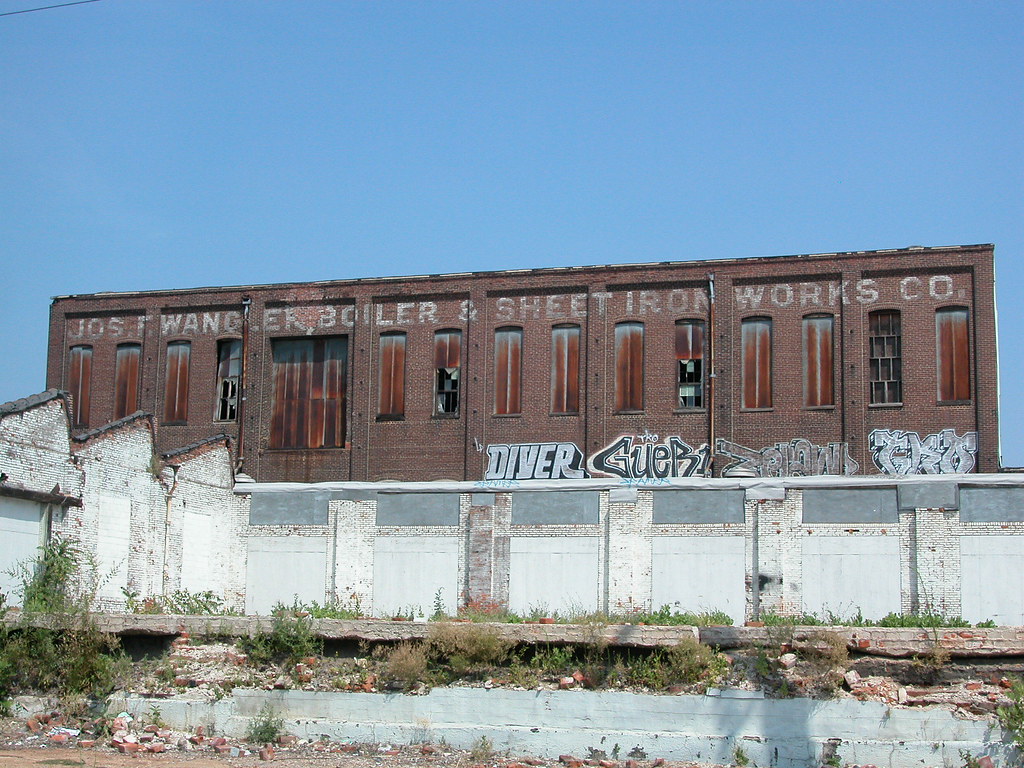 I report with relief that the latest footprint of the proposed Mississippi River Bridge at St. Louis reduces the number of historic buildings proposed for demolition to less than six. (Alas, the footprint will cover the site of the "big mound" at Broadway and Mound streets, which is potentially one of the city's most significant Native American archeological sites.) One of the buidlings in the path of the ramps connecting the bridge to Cass Avenue is the complex once occupied by the Joseph F. Wangler Boiler & Sheet Metal Works Company, located on the superblock (Mullanphy is closed) bounded by 10th, Howard, 9th and Cass. Much of the complex dates to mid-20th-century expansion, but at the core is a taller 19th-century brick building bearing the name of the company.
I report with relief that the latest footprint of the proposed Mississippi River Bridge at St. Louis reduces the number of historic buildings proposed for demolition to less than six. (Alas, the footprint will cover the site of the "big mound" at Broadway and Mound streets, which is potentially one of the city's most significant Native American archeological sites.) One of the buidlings in the path of the ramps connecting the bridge to Cass Avenue is the complex once occupied by the Joseph F. Wangler Boiler & Sheet Metal Works Company, located on the superblock (Mullanphy is closed) bounded by 10th, Howard, 9th and Cass. Much of the complex dates to mid-20th-century expansion, but at the core is a taller 19th-century brick building bearing the name of the company.The Wangler works warranted a mention in E.D. Kargau's 1893 Mercantile, Industrial and Professional St. Louis. Kargau noted that among St. Louis' many industrial concerns are but a few boiler makers, Wangler being one. The Wangler works started in 1864 as Cantwell & Wangler before falling under control of Joseph F. Wangler, a Pittsburgh native. The first location was at 1019-23 Main Street, but the firm need space and moved west to the block where its name can still be read.
According to Kargau, the Wangler shops "are equipped with the most approved and modern machinery and the work turned out from them is unsurpassed in exact workmanship, durability and quality of material and are always closely examined before being sent out" (page 295). Among these renowned works were, of course, boilers as well as sheet iron work, storage tanks and tanks for ice machines.
Kargau had much praise for Wangler and his sons as business leaders, stating that they "are at all times ready to participate in every movement for the welfare and in the interest of the community" (page 296). Long gone are these men, their company and the spirit of enlightened civic business culture. We have only a few buildings from the boiler works to remind us of the Wanglers' good work, and not for more than another decade. Some may find a new bridge to be a work in the interest of popular welfare, but the fruits of employment found at the boiler works provided more bread to the common person than the new bridge ever will.





1 comment:
Isn't there an equivalent of the section 106 review that needs to be done, relating specifically to the mound?
Post a Comment